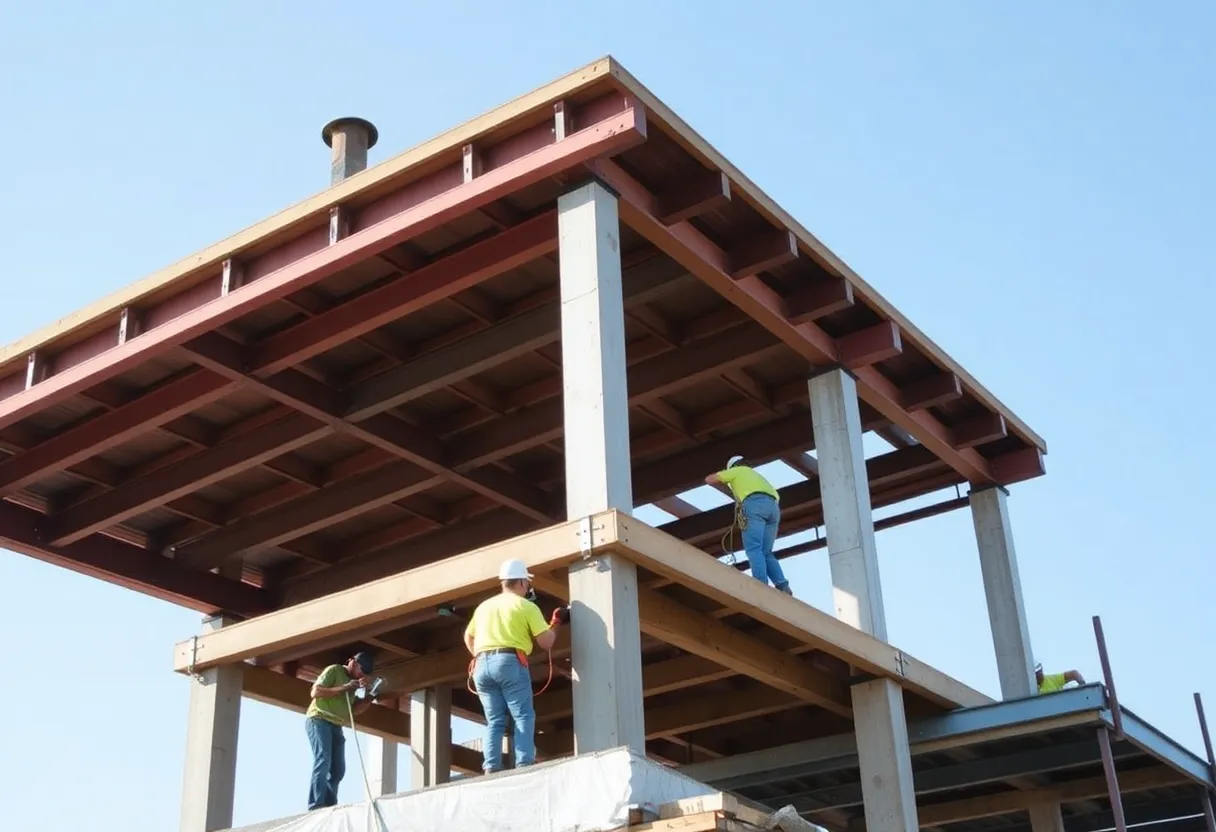Seattle, August 27, 2025
News Summary
A multi‑year collaboration between a leading construction platform and a major cloud provider is introducing AI agents, real‑time analytics and a searchable intelligence layer into construction workflows. The platform, branded with an intelligence layer that turns site diaries and RFIs into continuous insights, automates tasks like drafting RFIs, flagging spec mismatches and surfacing missing documents. The push coincides with a Seattle startup raising an $8M seed to automate field work, a city pilot using AI to speed permit reviews, and a new mass‑timber AI research HQ — all underscoring rapid industry adoption and attendant integration and dependence risks.
Major AI push reshapes construction tech: Procore and AWS team up as startups and cities test new tools
A multi‑year collaboration between a major construction software firm and a leading cloud provider is pushing artificial intelligence deeper into construction workflows, while startups and city pilots race to put similar tools to work. The partnership aims to add automated agents, real‑time analytics and training tools to field operations, even as a new Seattle permitting pilot and a fresh stretch of AI‑driven startups and research activity highlight how fast the industry is changing.
What’s new at the top: AI agents, analytics and cloud scale
A construction management company announced a long‑term strategic deal with a cloud giant to embed AI into project workflows. The work links the construction platform to cloud infrastructure and large language models so it can run AI agents that automate repetitive tasks, speed scheduling, and surface problems before they grow costly. The platform now includes an AI intelligence layer called Procore Helix, which turns static records such as site diaries, submittals and RFIs into continuous, searchable intelligence.
The new agents can draft requests for information in seconds rather than hours, flag specification mismatches, and point out missing documents in near real time. The cloud provider’s platform is being used to host the models and to scale access through its marketplace in North America and Europe. Financial terms of the deal were not disclosed.
Big picture: why construction is in the crosshairs
Construction is widely seen as behind other sectors on digital adoption, with long project timelines, fragmented workflows and heavy reliance on manual labor. Industry data show average projects run roughly 20% over budget, and the U.S. construction sector faces a chronic labor shortage with hundreds of thousands of open roles. Backers of the partnership say automation and predictive analytics could cut overruns, reduce risk, and create subscription and usage‑based revenue streams for software vendors.
The market for AI in construction is projected to grow rapidly, from roughly $2.1 billion in 2023 to more than $22 billion by 2032. Analysts flag adoption risks, including industry fragmentation, resistance to change on job sites, and vendor concentration on a single cloud provider that could expose customers to future price or competitive risks.
Startup traction: a Seattle‑based company raises $8 million seed to automate field work
A Seattle startup emerged from stealth with an $8 million seed round led by two venture firms and several other investors and angels. The company builds construction management software that embeds field‑trained AI agents to automate permit review, takeoffs, estimates, jobsite documentation, vendor coordination, procurement and warranty work.
The startup says its agents capture far more jobsite data than past methods and can save construction teams more than ten hours per week. Its platform can run as a full management system or integrate with existing tools such as SMS and email. Founders include engineers with prior experience building machine learning products at large fintech firms; one founder also has direct experience running construction projects.
City pilot: Seattle launches AI permitting effort to speed housing and small business approvals
A city executive order created a cross‑department Permitting and Customer Trust team to cut red tape for housing and small business projects and launched an AI pilot meant to reduce permit review cycles substantially. The pilot began in April and a public roll‑out is expected the following year.
The city partnered with a vendor whose tool lets applicants upload plans and get AI‑driven feedback on missing information and code compliance before formal submission. Officials expect the AI to handle the majority of common mistakes and leave complex, judgmental work to staff. The permitting department reviews tens of thousands of permits and performs hundreds of thousands of on‑site inspections each year, and the new team must establish processes to limit permit reviews to no more than two cycles for straightforward cases by the end of the year.
Research and workspace: an AI institute moves into a mass‑timber headquarters
A research institute focused on AI moved into a new 50,000‑square‑foot mass‑timber headquarters that houses labs, studios and collaborative workspaces. The space supports roughly 225 staff and includes a robotics lab with a simulated home environment for testing household robots, large meeting rooms, recording facilities and outdoor‑facing patios. The fit‑out and building reflect a trend toward lower‑carbon building materials and modern lab design, and the institute continues to run separate incubator programs from a different waterfront location.
Why this matters to projects and investors
The moves show both incumbents and new entrants betting that AI can solve concrete pain points: slow reviews, wasted documentation, and predictable errors that add cost and delay. For construction firms the attraction is efficiency and reduced risk. For investors the appeal is higher‑margin, scalable software and new paid services. For cities, AI promises faster approvals and clearer guidance for applicants, though officials stress human oversight will remain central.
Risks and limits
Observers note several limits to rapid adoption: the scattered nature of construction teams and data, change resistance on jobsites, dependency on a single cloud provider for model hosting, and the need for staff to handle nuanced or safety‑critical decisions. Tools that flag code or documentation problems can reduce review cycles only if applicants act on the feedback and if agencies update internal processes accordingly.
Frequently Asked Questions
What does the cloud‑AI partnership do for construction teams?
It connects construction software to cloud‑hosted AI models so the platform can analyze large amounts of site data, generate documents like RFIs quickly, predict project risks, and help automate routine tasks. The goal is faster decisions and fewer errors.
How much time can AI save on a typical job?
Vendors and early customers report time savings in the range of hours per week per user on routine admin and coordination tasks. Exact savings vary by role and project complexity.
Is the technology ready to replace human reviewers?
No. City pilots and vendors frame AI as an assistant that catches common issues and speeds up basic checks. Human reviewers still handle judgment calls, complex code interpretations and safety decisions.
What are the main risks for firms adopting these AI tools?
Risks include fragmented data sources, resistance to changing field habits, dependence on a major cloud provider for hosting, potential cloud pricing shifts, and integration work across legacy systems.
Why did a research institute choose a mass‑timber building?
Mass timber offers structural performance similar to concrete or steel with a lower carbon footprint. The building also provides flexible lab and collaboration space suited to AI and robotics work.
Key features at a glance
| Item | Primary focus | Notable capabilities | Timing / scale |
|---|---|---|---|
| Procore + Cloud Provider | Embed AI across construction workflows | AI agents, Procore Helix, predictive analytics, marketplace distribution | Multi‑year deal; marketplace rollout in North America and Europe |
| Klutch AI (startup) | Field‑trained AI for jobsite automation | Permit review, takeoffs, documentation capture, vendor coordination; claims 10x data capture | $8M seed round; headquartered in Seattle; product announced June 2025 |
| Seattle PACT Team | Speed permitting and improve customer guidance | AI plan checks with pre‑submission feedback; process changes to limit review cycles | Pilot started in April 2025; public roll‑out expected 2026; department handles 53k+ permits/year |
| AI Research Institute HQ | Workspace and labs for AI and robotics | 50,000 sq ft mass‑timber space, robotics lab with simulated home, studios and collaboration areas | Lease announced July 2024; supports ~225 staff |
Deeper Dive: News & Info About This Topic
Additional Resources
- GeekWire: Photos inside the Allen Institute for AI’s new HQ in Seattle’s first major mass‑timber office building
- Wikipedia: Mass timber
- BusinessWire: Klutch AI Emerges from Stealth with $8M Seed to Bring Intelligent AI Agents to Construction Teams
- Google News: Klutch AI
- MyNorthwest: AI, security and construction chokepoints
- Google Scholar: AI in construction safety
- GeekWire: Seattle to deploy AI to speed up housing and small‑business permit process
- Google Search: Seattle AI permitting pilot
- CoStar: Allen Institute for Artificial Intelligence (facility coverage)
- Encyclopedia Britannica: artificial intelligence institute
Author: Construction FL News
The FLORIDA STAFF WRITER represents the experienced team at constructionflnews.com, your go-to source for actionable local news and information in Florida and beyond. Specializing in "news you can use," we cover essential topics like product reviews for personal and business needs, local business directories, politics, real estate trends, neighborhood insights, and state news affecting the area—with deep expertise drawn from years of dedicated reporting and strong community input, including local press releases and business updates. We deliver top reporting on high-value events such as the Florida Build Expo, major infrastructure projects, and advancements in construction technology showcases. Our coverage extends to key organizations like the Associated Builders and Contractors of Florida and the Florida Home Builders Association, plus leading businesses in construction and legal services that power the local economy such as CMiC Global and Shutts & Bowen LLP. As part of the broader network, including constructioncanews.com, constructionnynews.com, and constructiontxnews.com, we provide comprehensive, credible insights into the dynamic construction landscape across multiple states.





